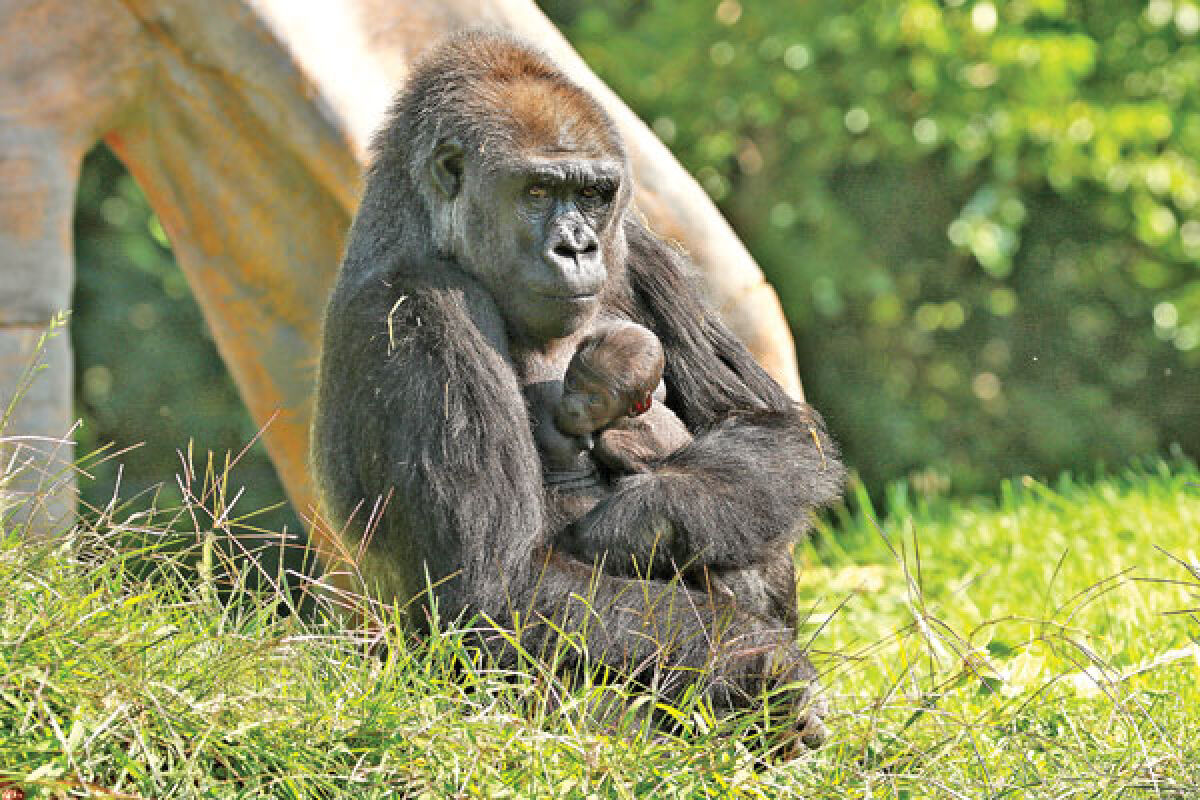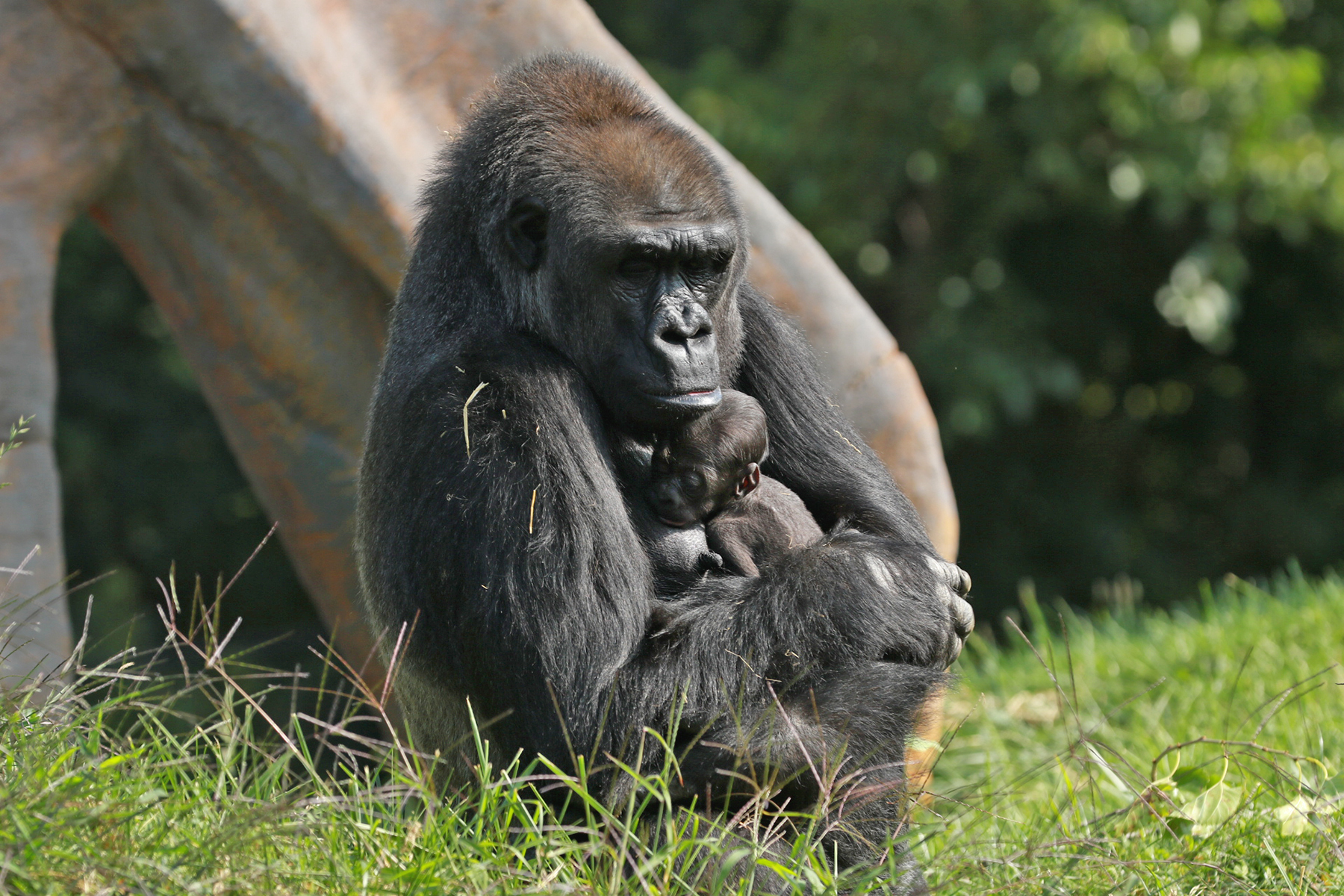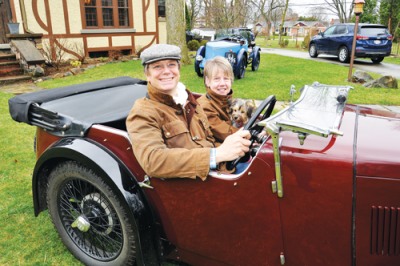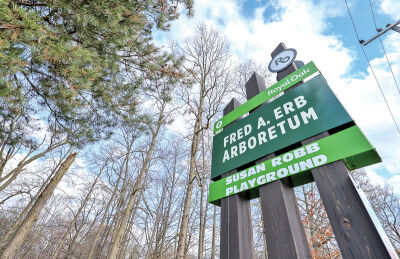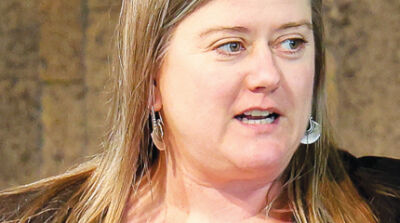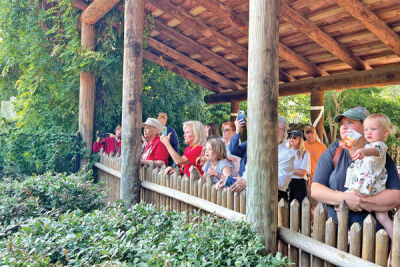
Detroit Zoo visitors are in awe checking out the new baby gorilla Aug. 23. The baby is the first gorilla born at the zoo in its 96-year-history.
Photo by Erin Sanchez
ROYAL OAK — For the first time in the Detroit Zoo’s 96-year history, a baby gorilla has been born at it, and according to the zoo’s experts, the first few weeks of the baby gorilla’s life have been ideal.
On Aug. 26, the Detroit Zoological Society announced that the baby gorilla is a girl, and the public will help choose her name.
On the morning of Aug. 8, the baby girl was born to 26-year-old Bandia, a first-time mother. The father is 36-year-old Mshindi, and both are doing well as parents, according to Detroit Zoological Society mammal and primate teams.
Aaron Jesue, a member of the animal care staff specializing in great apes, said that the coming of this new baby was fast and surprising, being that it took a little less than a year for Bandia to get pregnant and have a baby.
Bandia, Mshindi, 11-year-old Nayembi and 20-year-old Tulivu, all arrived in August of 2023. Jesue said that the group has been acclimating well to the new addition.
“As soon as we saw that first pregnancy test — then we got another confirmation a couple weeks later, or maybe a month later — everything kicked into high gear,” Jesue said. “We were enjoying it along the way, but it was a really good and fast turnaround from the point that they got here, the group was all together, doing great, and then boom, pregnant.”
For around 20 years, the Detroit Zoo took on the role of housing male apes, which they called a bachelor group. According to Jesue, the Detroit Zoological Society had one of the longest-running bachelor groups in the entire country.
The goal with bringing in the female apes was to ultimately mate Mshindi and have a baby born.
“It’s just such a cool, full-circle moment in only a year’s time, to where we were so used to working with the bachelor boys, we knew what to expect with them on any given day, and everything just completely changed a year ago, and it’s continuing to change,” Jesue said.
Tami Brightrall, associate curator of mammals for the Detroit Zoological Society, said that planning a gorilla pregnancy is a tedious and serious process.
Brightrall said there are around 350 gorillas in about 49 zoos in North America, and those gorillas are managed by a committee of people with the Association of Zoos and Aquariums. She said the committee works together to figure out the best pairings for gorillas for a genetically diverse gorilla population in zoos.
“Here at the Detroit Zoo, the recommendation was for Bandia to breed with Mshindi. It worked,” she said. “They like each other, and they have been together for years, not only at this zoo, but at another zoo as well, so it worked well.”
Having a gorilla family within the zoo is a positive and enriching experience for all the gorillas in the enclosure, according to Brightrall, and a big development for Bandia.
“The mother gorilla having a baby and caring for it is a really big part of their life. It’s a goal for them to breed and reproduce, so for them to fulfill that, it makes their whole life fulfilled,” she said. “It also makes Bandia experienced, so if she has another baby, we are going to know that this mother is really good, she pats the baby, she looks after the baby.”
As Brightrall said, Bandia is an excellent mother, which is backed up by Jesue, who said that this could have turned out to be very different. In some cases, the mother gorilla might not want to look after the baby, which would then be handed over to a surrogate mother to take care of it.
“When Bandia was born at the Pittsburgh Zoo, her mom was not a great mom. She didn’t take care of her the way that Bandia is taking care of her baby now, holding her and stuff,” he said. “We were worried that with her background and being in other groups where she did not really see a ton of other successful moms, that it wouldn’t click for her, she wouldn’t know.”
To help prevent this, the mammal team tried to train Bandia as best as possible before she gave birth, and helped to shape her into the mother she is today.
“Because of her background, we wanted to make sure that there were other options where we could encourage and help train her to know what she needed to do in certain situations,” he said. “So, what we would do for the maternal training is that I would carry a stuffed gorilla and show her how to hold it correctly, where it’s facing her body, so the baby could be the one to figure out if it needed a nurse.”
The team would also desensitize Bandia to the various ways a baby gorilla might touch her, pull her hair, mimicking the movements of a newborn baby.
The tests and training proved to be successful, as Bandia is a very protective and loving mother. She has shown no signs of wanting to disown the baby, and is seemingly content with her new role as a mother.
Brightrall said that the outcome of Bandia’s pregnancy is a testament to the commitment and care that the Detroit Zoological Society team has for its primates.
“They are willing to take risks and chances, appropriate risks and chances, but that is a very big deal that these primate keepers are so good at their jobs,” she said. “They were like, it might be scary, but let’s do it. It might be fast; let’s do it.”
The next phase in this process is for the baby gorilla to be named.
According to a press release, it will be up to the public to figure out what the baby girl will be called, in the form of a vote.
Voting opened Aug. 26, and each vote requires a minimum of a $10 donation. People can choose from one of the following names: Usala, Amateka, Mbere, Lobeke, and Motema.
Each name has a unique story behind it, Usala comes from the conservation corridor in the Democratic Republic of the Congo, and also means “forest” in Kikumu.
Amateka means “history” in Kinyarwanda. Mbere means “first” in Kinyarwanda. The name Lobeke comes from the national park in Cameroon, which is home to the highest density of western lowland gorillas in the world. Finally, Motema means “heart” in Lingala.
The winner will be determined by the name that receives the highest donation amount. All donations will be going to the Saving Animals from Extinction Program. The program helps wild gorilla populations through on-the-ground protection of gorillas, research and monitoring, according to the zoo.
Voting will be open through Sept. 9, and members of the public can vote as many times as they want, with a $10 donation for each vote. The zoo will announce the winning name shortly after the contest concludes.
People can find more information on the baby and voting at detroitzoo.org.
 Publication select ▼
Publication select ▼